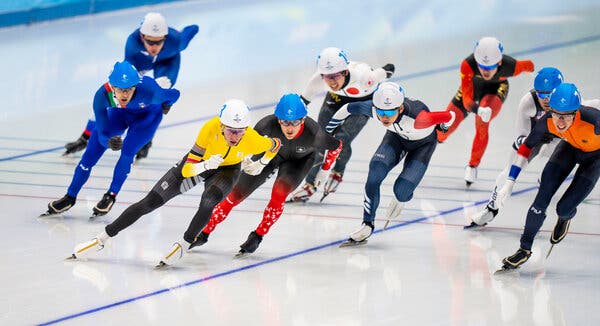
Bart Swings of Belgium, the silver medalist in speedskating’s men’s mass start race four years ago, got his timing right on Saturday and won the gold in Beijing.
Chung Jae Won of South Korea won a furious sprint among three skaters to claim the silver. His teammate Lee Seung Hoon, the defending Olympic champion, took the bronze.
Joey Mantia, the 36-year-old American who had been expected to contend for the gold, missed the bronze in a photo finish, but said afterward that a foul by Lee had cost him a shot at the podium.
“I don’t know how I feel,” Mantia said. “I hope they do something about that call at the end. I felt like I was cheated. Maybe I’m biased about that, but I felt like his hand was on my arm, pulling me back. From what I can see from the replay my foot was in front of his, and then his foot came in front of mine. How did that happen if I’m gaining on him?”
No ruling came, however, and Lee stepped up beside Swings and Chung to claim his medal. Both were officially given the same time.
|
Bart Swings Belgium |
|
|
Chung Jae Won South Korea |
|
|
Lee Seung Hoon South Korea |
The gold was the first for Belgium at the Winter Games in 74 years.
Long-track speedskating can be a bit sedate when it comes to the lengthier races. In those events, athletes cruise around smooth ice rinks, their arms resting behind their backs as they race only against the clock.
The mass start event, which first appeared at the 2018 Olympics, livens things up significantly. In the roughly four-mile race, 20 or more skaters are on the ice at the same time, drafting and jousting for position. Stay in your lane? Not in the mass start.
Even die-hard fans of speedskating acknowledge that the mass start packs more excitement than the sport’s traditional races. “I’ve been doing long track for about six years now,” Mantia said in 2018, “and I love the sport, but it’s a little tough to watch sometimes.”
Mantia, who part of the United States team pursuit squad that won a bronze on Tuesday, started in in-line skating, a sport in which almost every race is a mass start. He knew he would be facing a formidable foe in Swings, who has also had a long and impressive in-line skating career. But in a photo finish, Mantia, the faster sprinter of the two men, was expected to have the edge.
Instead, Lee beat him by what appeared to be less than an inch.
Irene Schouten of the Netherlands won the women’s race, and picked up her third gold medal of the Beijing Games, by chasing down Canada’s Ivanie Blondin at the finish.
Schouten screamed as she crossed the line.
“With just 500 meter to go, I thought, This is going to slow, I have to go faster now,” Schouten said. “I just went all out and thought, If they’re faster, they’re faster.
“When I came out of the final corner, I felt like I had more speed than Ivanie. I just flew over that finish line.”
Her gold in the final race of the speedskating competition providing a perfect bookend: Her victory in the 3,000 meters had come in the first speedskating race of the Olympics. She also won at 5,000 meters.




